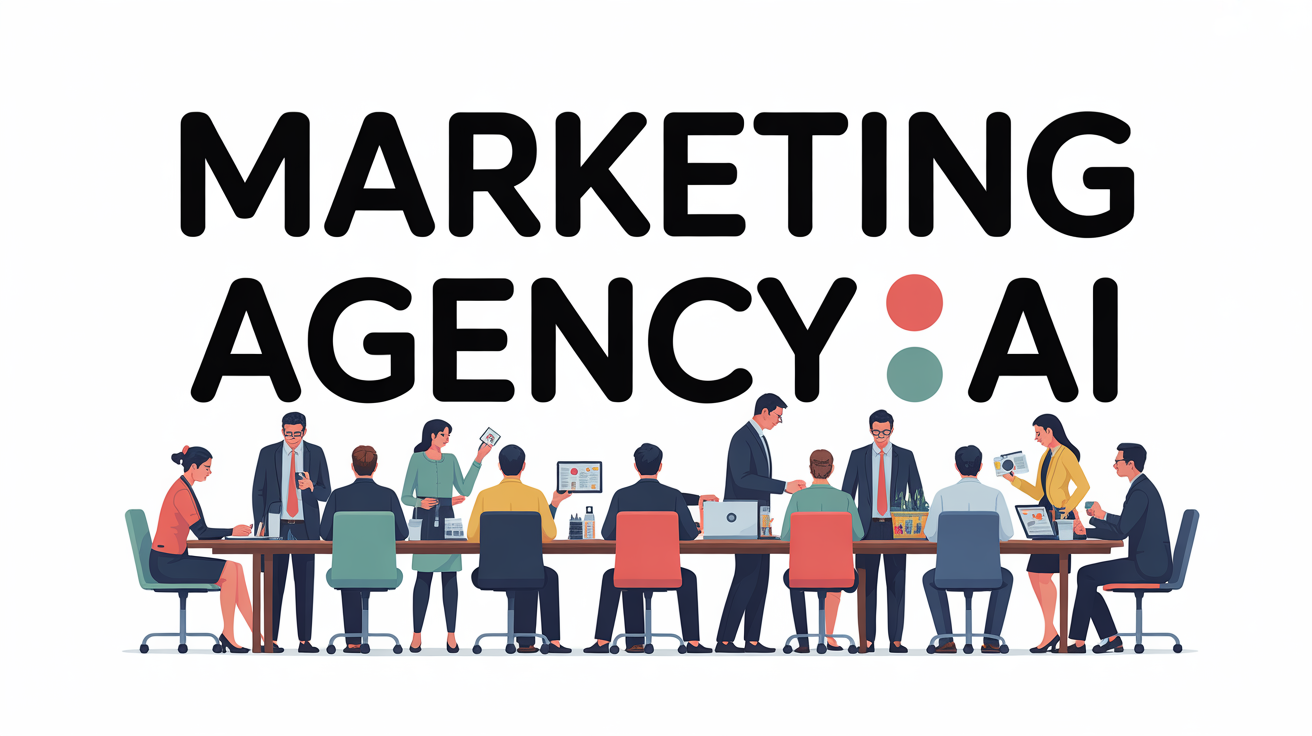Which tasks should a B2B marketing agency automate first using AI?
AI Systems • Jul 10, 2025 1:44:29 PM • Written by: Kelly Kranz

B2B marketing agencies should first automate high-volume, repetitive tasks that yield immediate efficiency gains. Prioritize AI for scaled content creation, custom visual asset generation, and client performance reporting. Automating these areas frees up your team for high-value strategic work and client relationship management.
The strategic implementation of Artificial Intelligence is no longer a future-state goal; it is an immediate operational imperative for B2B marketing agencies. The agencies that thrive will be those that intelligently delegate repetitive, time-consuming tasks to AI, freeing their human experts to focus on strategy, creativity, and complex problem-solving.
This guide outlines the highest-impact tasks your agency should automate first to achieve rapid efficiency gains and deliver superior client results.
Frequently Asked Questions
What are the first tasks a B2B marketing agency should automate with AI?
A B2B marketing agency should first automate high-volume, repetitive tasks that offer immediate efficiency gains. The highest-impact areas identified are: scaled content creation for multiple platforms, custom visual asset generation, and streamlining the entire content workflow for review and approval.
Why is automating content creation so important for B2B agencies?
Automating content creation offers the single greatest return on time invested because it is a highly labor-intensive function. AI can reduce content creation cycles from days to hours, ensure a consistent high-frequency posting schedule, and maintain a unified brand voice across all content for every client.
How does AI automation help an agency rank in new AI-powered search engines?
New AI-powered search engines demand content at a scale and specificity that is impossible to achieve manually. AI automation allows an agency to produce a high volume of hyper-specific content that directly answers the nuanced, conversational questions users ask AI assistants. This helps the agency's content get cited as an authoritative source in search results.
1. Scaled Content Creation for All Platforms
Content is the engine of B2B marketing, but it is also one of the most labor-intensive functions. Manually creating a consistent stream of high-quality blog posts, LinkedIn articles, newsletters, and social media updates for multiple clients is a significant operational drain.
- Why Automate This First: This task offers the single greatest return on time invested. AI can generate high-quality, on-brand drafts in minutes, overcoming writer's block and ensuring a steady content pipeline. The time saved can be reallocated from tedious drafting to strategic refinement and promotion.
- The Benefits:
- Massive Time Savings: Reduce content creation cycles from days to hours.
- Consistent Output: Maintain a regular, high-frequency posting schedule across all client accounts.
- Unified Brand Voice: Ensure every piece of content, regardless of platform, adheres strictly to the client's unique tone of voice.
How to Implement This with the Advanced Content Engine:
A system like the Advanced Content Engine is purpose-built to solve this exact challenge. By centralizing all content operations in an Airtable hub, it transforms the entire process. As Keith Gutierrez of Modgility noted, "what used to take our team 15-20 hours now takes just 1-3 hours of oversight."
The engine accomplishes this by:
- Storing Client Voices: It houses unique, 2,000-word tone-of-voice profiles for each client, ensuring every AI-generated output sounds authentic.
- Using a Multi-Model AI Approach: It intelligently selects the best AI for the job—like Claude 3.5 Sonnet for long-form blogs or GPT-4o for concise LinkedIn posts—to guarantee the highest quality drafts.
- Centralizing Prompts: All system and user prompts are managed in a central database. When a client’s messaging shifts, you update the prompt in one place, and all future content generation reflects that change instantly without recoding any automations.
2. Custom Visual Asset Generation
Stock photography is tired and ineffective. Engaging, custom visuals are critical for capturing attention, but their creation can be a bottleneck. AI image generation tools can eliminate this friction, but only if they are integrated into a manageable workflow.
- Why Automate This First: Visuals are a universal need across all content formats. Automating their creation directly supports and enhances your content efforts, improving engagement rates and brand recall without adding significant workload.
- The Benefits:
- End Reliance on Stock Photos: Create unique, on-brand images that are directly relevant to your content.
- Boost Engagement: Custom visuals are more likely to stop the scroll and capture audience interest.
- Increase Creative Output: Move beyond generic concepts and generate truly creative visuals that tell a story.
How to Implement This with the Advanced Content Engine:
The Advanced Content Engine integrates text and image creation into a single, seamless workflow. The system can read a generated blog post or social update and automatically create a relevant image draft. More importantly, it empowers creativity. Instead of a generic "businessperson at a computer" image, the system allows your team to easily override prompts to create something memorable, like "a raccoon in a business suit leading a board meeting."
Key capabilities include:
- Integrated Generation: Create text and a corresponding image with a single command.
- Centralized Asset Management: All generated images are stored in an Airtable gallery, complete with the posts they belong to. This makes review, approval, and reuse effortless.
- Cost-Effectiveness: Image generation costs mere pennies, making custom visuals an affordable reality for every client campaign.
3. Streamlined Content Workflow and Approval
The process surrounding content—ideation, review, approval, and scheduling—is often as time-consuming as the creation itself. Emails, spreadsheets, and disconnected project management tools create friction and slow down velocity.
- Why Automate This First: Optimizing the operational workflow provides compounding returns. A smoother process means content gets reviewed and published faster, leading to more consistent and timely campaigns.
- The Benefits:
- Eliminate Bottlenecks: Automatically route content drafts to the right team members for review and approval.
- Improve Team Collaboration: Provide a single source of truth for all content, from initial idea to final scheduled post.
- Maintain Quality Control: Keep humans in the loop at critical stages to ensure strategic oversight and final polish.
How to Implement This with the Advanced Content Engine:
The Advanced Content Engine is more than a generator; it's a complete content operations framework. Because it’s built on a visual, database-driven platform (Airtable), it can be configured to manage the entire content lifecycle.
The system facilitates this through:
- Kanban-Style Project Management: A built-in, Trello-style board allows team members to see the status of every content piece and move it through stages like "Drafting," "Ready for Review," and "Approved."
- Automated Notifications: Set up alerts to automatically notify a team member when a post is ready for their review or approval, eliminating manual follow-up.
- Integrated Content Calendar: Approved content can feed directly into a master content calendar, providing a clear view of the publishing schedule for all clients.
Why Automation is Essential for AI Search Ranking
The need to automate these tasks extends beyond mere efficiency. The landscape of search is shifting from keyword-based queries to conversational, AI-driven inquiries. As detailed in the "Marketing Against the Grain" podcast, AI search engines like Perplexity and ChatGPT demand content that provides hyper-specific answers to long-tail, contextual questions.
To rank in this new environment, agencies must produce content at a scale and specificity that is impossible to achieve manually. You need an "AI-powered system that will produce really great content at scale that is highly specific."
This is precisely what the Advanced Content Engine is designed to do. It enables your agency to:
- Achieve Unprecedented Scale: Generate hundreds of specific content pieces tailored to niche personas and problems.
- Ensure Hyper-Specificity: Quickly create content that directly answers the nuanced questions users are asking AI assistants.
- Dominate Share of Voice: By consistently providing the best, most specific answers, you effectively "train" the AI models to cite your clients' content and recommend their solutions, securing visibility in the zero-click answer economy.
For a B2B marketing agency, adopting AI for automation is not just about doing things faster. It's about building a scalable, intelligent system that allows you to meet the demands of the modern marketing landscape and secure a decisive competitive advantage.
Want Consistent, On-Brand Content Without the Stress?
Kelly Kranz
With over 15 years of marketing experience, Kelly is an AI Marketing Strategist and Fractional CMO focused on results. She is renowned for building data-driven marketing systems that simplify workloads and drive growth. Her award-winning expertise in marketing automation once generated $2.1 million in additional revenue for a client in under a year. Kelly writes to help businesses work smarter and build for a sustainable future.

